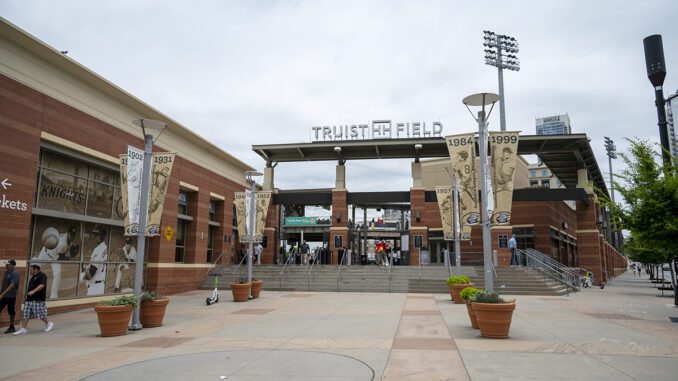
The Oakland Athletics will be packing their bags for Las Vegas, a long-expected move that will affect baseball’s fandom far beyond those two cities.
MLB is now a significant step closer to expansion, which will bring two more long-overdue franchises into the big leagues while also necessitating the creation of eight new minor-league teams around the country.
When the Athletics tidy up the multibillion-dollar details in Sin City, where they’re expected to reside by the 2027 season if not sooner, a new stadium for the Tampa Bay Rays will be the last hurdle to a 32-team major leagues.
For sure, the lobbying has already begun for cities like Nashville, Charlotte, Montreal, Portland and recently pitched expansion candidate Salt Lake City.
“The game is ready to grow its fan base,” said former big league pitcher Dave Stewart, one of the leaders of a Nashville expansion effort that already has nicknamed its potential team the Stars. “It’s trying to get today’s generation back at the ballpark and in the game. There’s a great light for expansion. I think baseball is ready for it.”
Stewart, a native of Oakland who pitched for the Athletics during a run of three straight AL titles that included the 1989 World Series championship, is sad that his former team is leaving his hometown. He hopes there is still a way for the A’s to remain in the Bay Area, even though city officials say they have ended negotiations on a new stadium.
“The history, legacy and tradition of the Oakland A’s is no longer going to be there,” Stewart said Friday in a telephone interview. “That’s really heartbreaking for me and heartbreaking for the community.”
But with Las Vegas set to be the new home of the Athletics, a strong challenger to Nashville and any other expansion bid has been eliminated.
Here’s a look at the pros and cons of the expected expansion candidates, who all must come to the table with a deep-pocketed ownership group and firm plans for a new stadium.
Nashville
Pros: Instant rivalries with teams such as the Braves and Reds. A trendy city that has shown it can support big league sports with the NFL’s Titans and NHL’s Predators. A well-organized expansion group that includes Stewart, Hall of Fame manager Tony La Russa and some big hitters from the music business. “This is a music hub, an entertainment hub,” Stewart said, noting that baseball has held its winter meetings in Nashville. “There’s tremendous growth from all across the country, people migrating here.”
Cons: A new stadium will have to be privately financed — a con for the potential ownership group, at least. Nashville already built a 30,000-seat facility for its Major League Soccer team and recently agreed to $1.2 billion in city and state funding to construct a new domed football arena for the Titans.
Charlotte
Pros: The most populous U.S. metro area among the potential candidates at more than 2.7 million. A natural rival for the Braves but far enough away not to infringe on Atlanta’s attendance.
Cons: MLB is not likely to add two Southern teams in such close proximity, and Nashville appears to have a head start on Charlotte.
Montreal
Pros: A storied history with the Expos, an MLB franchise from 1969-2004, and the minor league Royals, the team that Jackie Robinson played for on his way to becoming MLB’s first black player. The Expos had good fan support until financial issues led ownership to begin trading away their top players.
Cons: A costly, retractable-roof stadium is a necessity given Montreal’s climate, and there seems little willingness to dole out tax dollars to build such a facility.
Portland
Pros: The Pacific Northwest could use another MLB franchise to go along with the Seattle Mariners. There certainly appears to be room for a new team in Portland, which has only the NBA’s Trail Blazers and a pair of soccer clubs vying for pro sports dollars. An expansion team could be nicknamed the Mavericks, honoring the storied independent minor-league team from the 1970s.
Cons: Plans for a new stadium sure look good on paper, but the expansion group Portland Diamond Project will have to lock down a concept that relies mostly on private funding.
Salt Lake City
Pros: A growing city that, like Portland, would seem to have room for another team with only the NBA’s Jazz representing the Big Four sports. A new franchise would fill a gaping geographic hole between Denver and the Pacific Coast. A prospective ownership group recently unveiled plans for a new stadium.
Cons: By far the smallest of the prospective cities with a metro population of around 1.2 million, though expansion backers prefer to focus on the 2.7 million living along the Wasatch Front region stretching from Ogden in the north to Provo in the south.
So, who are the favorites?
We would love to see the Expos revived in Montreal, a city that truly got a bum deal during its first big league run, but it’s hard to envision any scenario where the locals agree to dole out hundreds of millions in Canadian dollars for a new stadium.
Therefore, we’re picking Nashville and Portland as the cities most likely to receive an expansion franchise.



